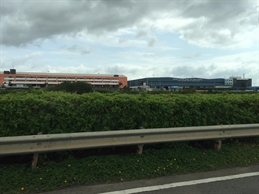
Bengaluru airport is breaking the general gloom in the air cargo sector with double-digit growth, a spokesperson for the city’s airport told Asia Cargo News.
Kempegowda International Airport in Bengaluru (BLR Airport) moved a record 386,780 metric tonnes (MT) of cargo during the 2018-19 financial year, leading to year-on-year growth of 11%, the spokesperson said.
Domestic cargo grew by 12.2% to 144,130 MT in 2018-19, while international shipments saw 10.3% growth to 242,650 MT, the spokesperson added.
The facility is confident about the future – both short-term and long-term.
“We believe that the market will recover over the next year, and the long-term outlook for cargo at BLR Airport is optimistic,” said the spokesperson, after acknowledging that the cargo market was “fairly subdued” during the year just gone – something he attributed to a global economic slowdown and global trade issues.
Beyond that, BLR’s cargo potential is estimated to reach 1.4 million MT by 2038 – a near tripling. Domestic cargo is estimated to reach 650,000 MT and international shipments 760,000 MT by that year.
“With the largest air cargo handling capacity in South India at 570,000 MT per annum, and an average travel time of nine hours from major manufacturing clusters in South India, BLR Airport is now the preferred cargo centre for industries in South India,” said the spokesperson.
Helping matters is a diversity of goods moving in both directions.
Major exports from BLR include perishables, textiles, electronics, heavy machinery, high precision equipment, pharma and chemicals. Some of these – particularly electronics and heavy machinery – are also on the import list, along with healthcare and life sciences, auto components, aerospace components and high precision equipment.
Much of this is going to the Middle East which, along with Europe, North America and the ASEAN countries, are the top destinations.
There is scope to further expand capacity up to 850,000 MT; the details which BLR shared with Asia Cargo News are impressive.
“In 2020, Bengaluru International Airport Limited (BIAL) will operationalize India’s first on-airport, state-of-the-art express cargo terminal for international express companies,” said the spokesperson, without elaboration. This comes after the opening of the airport’s second runway at the end of 2019 which gives the facility more capacity for trade.
The point, though, is clear: this is an airport with lots of potential going into the future.
“The most recent master plan update of BLR Airport has incorporated additional space for the development and building of an integrated air cargo and logistics hub. In addition, BIAL is in the process of setting up a truck parking facility spread over five acres. It will have amenities including F&B outlets, service stations and fuel stations,” said the spokesperson.
This is on top of an already impressive list of facilities.
The airport has one of India’s most mechanized cargo terminals, with facilities such as automated storage and retrieval systems (ASRS), elevated transfer vehicles (ETVs), very narrow aisle trucks (VNAs) and high-rise racking systems, lift and run systems (for ULD movement), reach stackers with barcode readers, and handheld devices.
On top of this, the dedicated pharma-handling zone Coolport has the capacity to handle 50,000 MT per annum and works to stop temperature excursions at its cold chain facilities. This covers not only goods in storage, but also those in the pre-loading area, right up to the time the cargo is loaded onto an aircraft, said the spokesperson.
Furthermore, BLR Airport is the first airport in South India to house a fully-operational drug control lab. Although the lab is the second in India, it is the largest such facility in the country.
“Testing of all export and import of pharmaceuticals required by the Customs Department is carried out at the cargo terminal itself. Locating the drug control lab within the airport has helped shippers affect considerable savings in transportation and time as they no longer need to go to a city laboratory for testing,” said the spokesperson of its significance.
BIAL has also strengthened connectivity to its catchment areas with the introduction of a dedicated road feeder service under the brand name LOGI Connect, connecting the South Indian cities of Tirupur, Coimbatore, Ambur, Chennai and Hyderabad with bonded and non-bonded operations to BLR Airport.
By Michael Mackey
Correspondent | Bangkok




